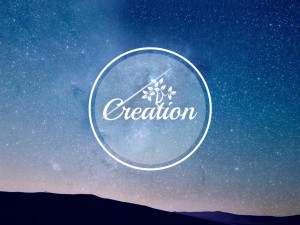[Part 2 of an adaptation of the “We are at Work” sermon at The District Church on May 17, 2015. Read Part 1 here.]
The story I want to talk about is one you may have heard before—it’s the story of God; it’s the gospel. This story—this gospel—as we understand it here at The District Church has four chapters: Creation, Fall, Redemption, and Renewal—and we need to understand all of them to understand the fullness of the story of God. Each chapter has something to say to our understanding of God, of life, of faith, of sin and evil, of suffering, of Jesus; and each chapter also has something to say to our understanding of work.
 Let’s start with Creation, where we learn this: we were made to work. You may not want that to be true, but there’s a reason why we feel more fulfilled when we’re working—and I don’t just mean the hours you spend at your job; I mean whatever you do with your time that fulfills the purpose for which God made you. We were made to work, and that’s why those of us who are unemployed and those of us who are underemployed—we feel the pain, the lack, the longing, the feeling of something missing, the feeling that we’re not doing everything we were created to do. In Genesis 1:26, God said:
Let’s start with Creation, where we learn this: we were made to work. You may not want that to be true, but there’s a reason why we feel more fulfilled when we’re working—and I don’t just mean the hours you spend at your job; I mean whatever you do with your time that fulfills the purpose for which God made you. We were made to work, and that’s why those of us who are unemployed and those of us who are underemployed—we feel the pain, the lack, the longing, the feeling of something missing, the feeling that we’re not doing everything we were created to do. In Genesis 1:26, God said:
Let us make mankind in our image, in our likeness, so that they may rule over the fish in the sea and the birds in the sky, over the livestock and all the wild animals, and over all the creatures that move along the ground.
The Hebrew word for “rule” here is radah; it can also be translated “have dominion.” It’s not an idle word, where you rule by being handed a title and sitting passively on a throne. It’s an active word; it requires effort. When God gives human beings their commission in Genesis 1:28, he uses the same word: “Rule.”
See, in the ancient world, kings and emperors used to construct statues of themselves in whatever region they ruled—statues in their image, in their likeness—as signs to whoever saw them that this king or that emperor was in charge. This is what it means when the Bible says we are made in God’s image, in God’s likeness. The purpose for which God created human beings was “so that they may rule,” so that we might be living testaments to the Maker and Ruler of all things.
Here’s another thing we learn from Creation. In Genesis 2:2-3, it says:
By the seventh day God had finished the work he had been doing; so on the seventh day he rested from all his work. Then God blessed the seventh day and made it holy, because on it he rested from all the work of creating that he had done.
The word that’s used here for God’s work—melaka—is the same word that is used in Exodus 20:9, where God is laying out the Ten Commandments and he says to the people of Israel, “Six days you shall labor and do all your work (melaka).” The same word is used for the work that God does and the work that we do. We work because God works. We’re created in the image of God; we’re created in the image of the God who works. Therefore, we’re also created to work; therefore, when we work, we show what God is like.
Pastor and author Tim Keller wrote a great book about faith and work; it’s called Every Good Endeavor, and he writes, “Work has dignity because it is something that God does and because we do it in God’s place, as his representatives.”[1] And the great English novelist Dorothy Sayers wrote, in the 1940s:
[Work is] a way of life in which the nature of man should find its proper exercise and delight and so fulfill itself to the glory of God. [It is] not, primarily, a thing one does to live, but the thing one lives to do. It is, or it should be, the full expression of the worker’s faculties, the thing in which he finds spiritual, mental and bodily satisfaction, and the medium in which he offers himself to God.
We were made to work.
 But the second chapter of the gospel story is the Fall, when humanity chose to disobey God, to turn away from God, to distrust God’s word and his promises, and sin entered the world. In the Genesis account, Adam and Eve chose to eat from the tree of the knowledge of good and evil, which God told them not to; but in our lives, we do that in our own ways—we act like we know it all, we choose to believe that we can do things on our own, we elevate ourselves to the place in our lives that only our Creator should be in. In Genesis 3:17-19, God says to Adam:
But the second chapter of the gospel story is the Fall, when humanity chose to disobey God, to turn away from God, to distrust God’s word and his promises, and sin entered the world. In the Genesis account, Adam and Eve chose to eat from the tree of the knowledge of good and evil, which God told them not to; but in our lives, we do that in our own ways—we act like we know it all, we choose to believe that we can do things on our own, we elevate ourselves to the place in our lives that only our Creator should be in. In Genesis 3:17-19, God says to Adam:
[Because you disobeyed me …]
Cursed is the ground because of you;
through painful toil you will eat food from it all the days of your life.
It will produce thorns and thistles for you,
and you will eat the plants of the field.
By the sweat of your brow you will eat your food
until you return to the ground,
since from it you were taken;
for dust you are and to dust you will return.
Sin is why the world is broken. Sin is why our relationships are fractured. And sin is why work is a struggle. We were made to work but sin makes what was intended to be a joy and a fulfillment of all of who we were created to be a “painful toil.” Sin is why everyone—at some point or other, and some more frequently than others—experiences the sense that our work is fruitless and maybe even pointless, even if we’re doing a job we feel called to.
Folks work with and teach students who don’t always respond with gratitude or in educational systems that seem to magnify the bad things instead of amplifying the good things. Others work with patients who don’t always appreciate the treatment they’re getting or who may continue abusing their bodies or who may be coming from or going back into very broken families. Part of the reason for this is that sin doesn’t just affect individuals; it affects systems, it lingers over generations, it multiplies as time goes on—and so we have underserved communities, we have disparities in income and inequalities in educational opportunities, we have people working multiple jobs and still not keeping their heads above water while a few have enough resources to not work at all, we have a city—the capital city of our nation—where almost a third of the children (29,000 kids) live below the federal poverty threshold.[2]
None of us is exempt from the effects of sin and, this side of Christ’s return, what we will always experience in our work is that not all is as it should be; and even if you were to find the perfect job that perfectly utilized your gifts and you got to work with the most awesome people, you would still come up against the realities of sin. Sin is why work is a struggle.
 Fortunately for us, sin is not the end. The third chapter is Redemption, which tells us that Jesus came to seek and save the lost, to set the captives free, to break the chains of oppression, to defeat sin and death once and for all. Jesus was the most human of us all, and by that I mean he was—and is—the truest representation of God, the fullest embodiment of God-in-charge, the most authentic image-bearer of God, in the way he showed grace and love, in the way he called out injustice and oppression, in the way he stood up for those the world had tossed aside. He did it in the way that he lived, in the example he set; and he did it most decisively in the way that he died on a cross for our sins and was raised from the dead to give us new life.
Fortunately for us, sin is not the end. The third chapter is Redemption, which tells us that Jesus came to seek and save the lost, to set the captives free, to break the chains of oppression, to defeat sin and death once and for all. Jesus was the most human of us all, and by that I mean he was—and is—the truest representation of God, the fullest embodiment of God-in-charge, the most authentic image-bearer of God, in the way he showed grace and love, in the way he called out injustice and oppression, in the way he stood up for those the world had tossed aside. He did it in the way that he lived, in the example he set; and he did it most decisively in the way that he died on a cross for our sins and was raised from the dead to give us new life.
See, the most significant way that Christ’s redemption impacts our work is that it restores our relationship with God—and therefore it reorders our relationship with our work. Because of the amazing grace of God, we no longer have to work our way back into his favor. We were made to work but sin made work and money and status and power and privilege idols for us, to be valued over God; and yet “through Christ Jesus,” the Apostle Paul wrote to the church in Rome, “the law of the Spirit who gives life has set you free from the law of sin and death” (Romans 8:2). Jesus came to bring redemption so that we might be restored to God, so that we might have hope and joy and peace, and so that our relationship with our work might be reordered and realigned the way it was supposed to be.
Oh, by the way, Jesus worked too. Scripture tells us that until he was about thirty years old, he worked as what was called a tekton, what’s normally translated as ‘carpenter.’ We also know that he was poor; and we know that when he first preached in Nazareth, the question that was asked was “Is not this the carpenter?”, which might be taken as, “Isn’t this just the carpenter?” See, the job Jesus did for most of his life didn’t seem to garner him much regard in the eyes of the world. Remember that, especially if and when you’re doing something that the world doesn’t seem to hold in great esteem. Jesus, our Teacher, our Master, our Lord, our Savior, our King, worked. And he sees you.
 And so we come to the fourth chapter of the story: Renewal. Jesus coming to earth and winning us back for God wasn’t the end of the story either; no, God the Father and Jesus the Son sent the third person of the Trinity—the Holy Spirit—to empower his church—that’s us—to continue the work they had been doing, to continue the mission they had begun, to play a part in this story. The Father worked, the Son worked, and the Spirit is at work in and through us as we live and work. And so renewal teaches us that we are recruited to work (again), to work with a reordered understanding of creation and of sin and of redemption and of our place in the whole story, and to partner with God in the work that he is doing through the church—remember, that’s us—setting the world right, setting our eyes on the vision of heaven coming to earth, of God’s kingdom and God’s government being fully established here on earth, and doing whatever it takes, doing whatever the Spirit asks us, to make that a reality. It is this broader calling that we are all entrusted with as followers of Christ; it is within this broader calling that we then figure out what our individual callings may be. If you spend all your life trying to figure out your own individual calling without responding to God’s broader call to the work of renewal, you’ll probably miss out on all of it; but if you spend all your life responding to God’s broader call to the work of renewal—wherever you find yourself—you’ll be fulfilling the purpose for which you were made, whether you find one thing to do for the rest of your life or not. It’s in working together in this grander work of renewal that we truly embody our identity individually as image bearers of God and corporately as the church, as the body of Christ.
And so we come to the fourth chapter of the story: Renewal. Jesus coming to earth and winning us back for God wasn’t the end of the story either; no, God the Father and Jesus the Son sent the third person of the Trinity—the Holy Spirit—to empower his church—that’s us—to continue the work they had been doing, to continue the mission they had begun, to play a part in this story. The Father worked, the Son worked, and the Spirit is at work in and through us as we live and work. And so renewal teaches us that we are recruited to work (again), to work with a reordered understanding of creation and of sin and of redemption and of our place in the whole story, and to partner with God in the work that he is doing through the church—remember, that’s us—setting the world right, setting our eyes on the vision of heaven coming to earth, of God’s kingdom and God’s government being fully established here on earth, and doing whatever it takes, doing whatever the Spirit asks us, to make that a reality. It is this broader calling that we are all entrusted with as followers of Christ; it is within this broader calling that we then figure out what our individual callings may be. If you spend all your life trying to figure out your own individual calling without responding to God’s broader call to the work of renewal, you’ll probably miss out on all of it; but if you spend all your life responding to God’s broader call to the work of renewal—wherever you find yourself—you’ll be fulfilling the purpose for which you were made, whether you find one thing to do for the rest of your life or not. It’s in working together in this grander work of renewal that we truly embody our identity individually as image bearers of God and corporately as the church, as the body of Christ.
Read Part 3 tomorrow.
—
[1] Keller, Every Good Endeavor, 49.
[2] http://www.nccp.org/profiles/DC_profile_7.html
Pingback:Why Work? Part 1: The Problem | JUSTIN FUNG
Pingback:Why Work? Part 3: A Challenge and an Encouragement | JUSTIN FUNG